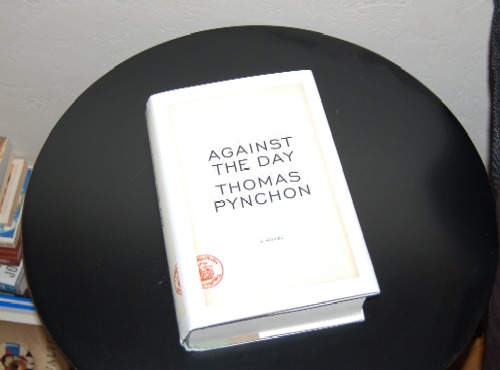…and it’s called The Good, The Bad and the Queen. Of course, with the way he starts new bands, he’ll have another one next month.
Month / October 2006
Your Tax Dollars Telling You What to Do as Adults
USA Today: “Now the government is targeting unmarried adults up to age 29 as part of its abstinence-only programs, which include millions of dollars in federal money that will be available to the states under revised federal grant guidelines for 2007. The government says the change is a clarification. But critics say it’s a clear signal of a more directed policy targeting the sexual behavior of adults.”
Deiter from Sprockets Comes to Mind
If you’ve ever wondered what Murakami translator Alfred Birnbaum looks like, now you know. (via Rake)
Franzen is Funny
Two “funnies” anyway from Lorrie Moore. Of course, at the New Yorker, every contributor is funny. Particularly when you’re contributing too.
Yeah, Last Time I Checked, That New Pynchon Novel is 120 Pages With a Three Act Structure
Seattle Times: “‘We’re looking into publishing books, too,’ reveals [Starbucks Chairman Howard] Schultz. ‘There’s so much talent out there, and they can’t find a publisher. It’d be a great service for emerging authors. Even as we speak, we have someone at William Morris [Literary Agency] who is reading scripts and treatments. It’s more than an idea. It’s something we’re serious about.'”
They’re Blaming Ted Hughes For the Delay of This One Too
Washington Post: “An unpublished sonnet that Sylvia Plath wrote in college while pondering themes in F. Scott Fitzgerald’s novel ‘The Great Gatsby’ will appear Wednesday in a Virginia online literary journal.”
Where TERA Meets MDMA?
Podcasting News: “Belucci specializes in house music. Topless djing may not be mainstream yet, but based on this video of Niki Belucci in action, it may not be far off.”
Now Who Will 50 Sue in 2020?
BBC: “A judge has dismissed claims by the ex-frontman of rap group 2 Live Crew that rapper 50 Cent stole the opening line for the 2003 single In Da Club. Luther Campbell filed a claim at Miami Federal Court in January that 50 Cent used a line from Campbell’s song It’s Your Birthday, changing just one word.”
Luther Campbell, as you will recall, was sued for similar purposes in 1992 and won.
My New Response to Windbags: “One Should ANALize the Poetry on page 43.”
The High Cost of Being at the Center of the Universe
New York Magazine: “Our dollar looks the same as the better-known U.S. version, but it doesn’t go nearly as far here as anywhere else. How much is it really worth? Based on a few scientifically imprecise calculations, a New York dollar would lag somewhere behind a Canadian buck.”
In Time for Halloween
Today, at Bella Stander’s, a number of fascinating “Publicity Terrible Tales” have been unleashed. My favorite: “The author who wouldn’t promote in Chicago because there was wind.”
This Week on Olbermann
Deconstructing Profiles #1
 EDITOR’S NOTE: The author profile piece is a tricky and intricate journalistic genre. How do you make an author, who is often mumbling an answer he has uttered a dozen times into a glass of water, interesting? Where lazier journalists might produce a simple Q&A transcript, this is simply not enough for the true journalistic blueblood, who, aspiring for more literary heights (or selfsame delusion of such), simply must describe how David Foster Wallace’s shock of hair curls over his shoulder when he is cowering from a hard question or the aggressive manner that Zadie Smith stabs her fork into quiche when discussing E.M. Forster.
EDITOR’S NOTE: The author profile piece is a tricky and intricate journalistic genre. How do you make an author, who is often mumbling an answer he has uttered a dozen times into a glass of water, interesting? Where lazier journalists might produce a simple Q&A transcript, this is simply not enough for the true journalistic blueblood, who, aspiring for more literary heights (or selfsame delusion of such), simply must describe how David Foster Wallace’s shock of hair curls over his shoulder when he is cowering from a hard question or the aggressive manner that Zadie Smith stabs her fork into quiche when discussing E.M. Forster.
The mix between meaningful conversation and seemingly picayune observational details is a delicate one, often confused for highbrow and lowbrow writing alike — the former practiced by the New York Times, the latter by People and US Weekly. Because of this, Return of the Reluctant has commissioned a new series entitled Deconstruction Profiles, enlisting the help of two grad students (referred to helpfully as Grad Student #1 and Grad Student #2) to remark upon some of the more perplexing details to be found in today’s author profiles.
We should note that this series is not intended to impugn the writer of the profile, who is often just as baffled as the reader. It cannot be overstressed that the blame must be leveled almost exclusively at the author (and adjunct publicists) for perpetuating a public image that, upon close examination, rings false and redolent.
Article Deconstructed: “I See Him in Me” by Lev Grossman
Author Profiled: Dave E—–
Excerpt #1: “E—– is, of course, a famous writer…”
Response of Grad Student #1: By what measure is the author famous outside of New York and San Francisco? And why should these two cities be the qualifier? Is he, for example, uttered in the same breath as Stephen King? Is he known in the Midwest? Or is he, much like Mailer before him, in the process of inventing his fame, of constructing an image of benevolence that renders criticism of his rather feeble efforts at fiction null and void?
Response of Grad Student #2: Spinoza wrote, “I could see the benefits which are acquired through fame and riches, and that I should be obliged to abandon the quest of such objects, if I seriously devoted myself to the search for something different and new. I perceived that if true happiness chanced to be placed in the former I should necessarily miss it; while if, on the other hand, it were not so placed, and I gave them my whole attention, I should equally fail.” This suggests, rather clearly, that the point of whether the author is famous is a moot one. It is, I would argue, largely unimportant in the grand scheme of the author’s worth. But since fame is of apparent concern to the author, then one must conclude, like Spinoza, that he is quite possibly a deeply unhappy individual. Perhaps because the author in question of terrified of even amicable criticism and thus inures himself of the world’s sullies by opting for hugs instead of punches. This munificence is often an affliction for politically correct liberals, but should have no bearing on who the author is or where he might be placed in the literary canon.
Excerpt #2: “Intrigued, E—- agreed to a meeting, and the two became friends. Now they’ve collaborated on a moving, frightening, improbably beautiful book, a lightly fictionalized version of Deng’s life titled What Is the What: The Autobiography of Valentino Achak Deng.”
Response of Grad Student #1: Properly speaking, this autobiography is something of a misnomer. Amazon and McSweeney’s list the book as being authored not by Valentino Achak Deng, but by one Dave E—–. In fact, Mr. Deng is not listed here as author. E—- seems not to have learned anything from The Autobiography of Malcolm X (As Told to Alex Haley), which was written by both Alex Haley and Malcolm X. One might argue that this solipsistic authorship is not, in fact, the actions of a “friend” at all, but an opportunist.
Response of Grad Student #2: The notion of E—- “agreeing” to a meeting sounds more like a capitalist than a philanthropist. It is a wry verb chosen by Mr. Grossman, who I suspect, burdened by the oppressive sunniness of writing author profiles, is having a good deal of fun on us here. (See also his use of “synergistic collaboration” in a later paragraph.) Further, the over-the-top string of modifiers suggests a mildly satirical form of high praise.
Excerpt #3: “What could have been an awkward literary three-legged race became instead a synergistic collaboration. In person there’s an obvious and rather touchingly empathic bond between the two: E—- is the confident, gregarious one, while Deng speaks in quiet, melodious, not-quite-grammatical English.”
Response of Grad Student #1: While I quibble with the redundant phrase “touchingly empathic,” there is much to be said of the “three-legged race” imagery and the notion that these two authors (well, one author, if you look at the spine) are possibly inseparable, suggesting that the two authors work in a kind of Maoist communal sense more at home in an autocracy than authorship. Note also the connotation of “legged” and “E—–.”
Response of Grad Student #2: If one is to value silence over gregariousness, then it is clear that Mr. Grossman is implying that Deng is the more noble of the two men. In what sense, for example, is a “synergistic collaboration” any way preferable to an “awkward literary three-legged race?”
Check Your Hubris At The Door
Check also your coats.
Blogging In Sick
Folks, I’m wiped. Freelancing assignments, three interviews in a week, a return to an ambitious project that’s been kicking my ass (but in a very good way), and podcast production have caused me to resort to episodes of the dreadful Torchwood (Charlie Anders nails probs with the Who spinoff here) when I’m not enjoying the hell out of the grand adventures of the Chums of Chance.
But I assure you that content will return tomorrow and that there are some very interesting podcasts coming up very soon which you won’t want to miss.
In the meantime, I recuse myself from a roundup today.
How Ozzie & Harriet Had Fun
“Dear John: Although I can’t write a good letter this is a note to let you know I’m your little twelve year old spanking girl.”
(via MeFi)
Lovecraft: It’s All in the Names
Kitabkhana: “The reason I like H P Lovecraft? He came up with book titles like Nyarlahotep, Azathoth and, in what might be an ominous portent for a pioneering Indian graphic novelist, The Doom That Comes to Sarnath.”
Lack of Closure — A Fictional Virtue?
Susan Gibb on Anthony Burgess: “The following sequence of his hospitalization, his return of free will, may indeed be considered an anti-climax. From there, we get another dose as he changes and decides to leave his old ways behind. Both areas, and perhaps the suicide decision as well, are offered as resolutions to the story. Yet Burgess has carried it out to a further, major change in the character’s life. Even so, this final resolution, Alex thinking of finding a wife and having a son, has been left open as to the ultimate future for Alex, as well as the future of society itself. Unanswered questions; the best form of unresolved resolution in fiction, if not in life.”
Podcast to Investigate Later
Point of Inquiry “is the premiere podcast of the Center for Inquiry, drawing on CFI’s relationship with the leading minds of the day including Nobel Prize-winning scientists, public intellectuals, social critics and thinkers, and renowned entertainers. Each episode combines incisive interviews, features and commentary focusing on CFI’s issues: religion, human values and the borderlands of science.” There are conversations with Salman Rushdie, Richard Dawkins, Daniel Dennett and the like.
Civil Discourse? If So, the End is Nigh
Fuck you, Morgan Spurlock. If you genuinely believe that a war fought on flimsy pretext, the erosion of our civil liberties, the wholesale inability of the assclown posse at 1600 Penn to understand the ramifications of our actions (much less listening to anyone with an opposing viewpoint), the oil crisis, the water crisis, the energy crisis, our insouciant approach to torture, the rampant criminalization of brown-skinned people without due process, wiretapping, the authoritarian impulses of the Department of Justice and their flyboy accomplices, and, most recently, Congress granting the President more freedom to declare martial law are actions that we can be civil about, as if they amount to some idyllic summer picnic rather than genuine affronts to human decency, then I really can’t fathom how the fuck you function. If Kerry’s defeat in 2004 proved anything, it was this: Who’s going to listen to some spineless fucktard (and, in Spurlock’s case, a two-bit filmmaker who struck it rich with a stunt more suited to a reality TV show than a documentary proper) describing something as grotesque as the deaths of our soldiers, the deaths of innocent civilians, and the torture of prisoners at Guantanamo Bay with a flatline timbre? What kind of human being do you have to be not to be angry about all this? What kind of orifice do you have to lodge your head into not to be pissed off? I realize that my anger is partisan, but I’d really like to know.
Who’s really going to believe some callow “liberal” with a stick up his smug anus talking about the realities that are unfolding around us?
It disheartens me in the extreme that so much of America would rather ignore the wholesale erosion of civil liberties and the deaths and the ancillary clusterfucks that ensure our role as the Alfred E. Neuman of the world, keeping their heads in the sand rather than trying to understand this once promising and now detestable working theory known as the American Empire. The United States of America is at the lowest point I’ve observed in my thirty-two years, and I don’t want it to be this way.
On the flip side, if I receive another fucking MoveOn email, I’m going to destroy something. How the fuck does some MoveOn party make a fucking difference? So I meet with my fellow liberals and we exchange delusions of grandeur. Wow! Such remarkable time management! Let’s not kid ourselves. We are at a point where only rigorous person-to-person contact, particularly with our apparent opponents, is going to work. We are at a point where we must get our asses into these so-called red states and find out why these folks think the way they do and what their concerns are and how we might work together. But I cannot see this happening.
Is there nobody out there who can speak with conviction, honesty, a rationale discernible to the layman, a daring quality to fight dirty when necessary, spitting in the face of authoritarian blackguards, and to convey some undeniable sense that we so-called liberals know what the hell we’re doing? In a country of 300 million people, I think not. Probability dictates otherwise.
Civility? Oh, I think any liberal knows deep down in her heart that we’re well beyond that point. These bastards want to fight dirty. And if we don’t fight dirty, if we don’t fight back as if our lives depended on it, then the midterm elections will be lost. And we will deserve the madness and the tyranny, even more augmented than the present scenario, that will come not long thereafter.
Rush Limbaugh’s Universe
Occupied

First page: epigraph from Thelonious Monk.
Flip.
Next page: Seal.
Flip.
Title page: One. The Light Over the Ranges.
Flip.
“Now single up all lines!”
“Cheerly now…handsomely…very well! Prepare to cast her off!”
“Windy City, here we come!”
“Hurrah! Up we go!”
It was amid such lively exclamation that the hydrogen skyship Inconvenience, its gondola draped with patriotic bunting, carrying a five-lad crew belonging to that celebrated aeronautics club known as the Chums of Chance, ascended briskly into the morning, and soon caught the southerly wind.
1,081 pages to go.
If You Want Bush to Stump You, Be Sure Your First Name is Dave
There can only be room for Dave in Bush’s brain.
ZeFrank vs. Rocketboom
ZeFrank’s The Show takes on Rocketboom, the Rocketboom Boy responds, and Ze responds further.
In Tony Snow’s Universe, An Electrocution to the Nuts is “Playful Shocking”
Editor & Publisher: “He said Cheney is not a guy who ‘slips up,’ but a reporter wondered if, in fact, it was no slip up—that is, we do waterboard, and the vice president wanted to signal to voters that the Republicans are tougher than the Democrats. Asked to define ‘a dunk in the water,’ Snow replied: ‘A dunk in the water.’ A reporter later asked, if dunking does not mean waterboarding, does that mean there’s a new swimming pool at Guantanomo? That did not get a reply.”
Memo to Tanenhaus: Liesl’s Your Only Shot

Dear Mr. Tanenhaus:
Nearly every serious literary person knows that your finger ain’t exactly on the pulse of contemporary fiction. Your coverage, even when it does concern itself with literature, often misses the mark. (This week’s issue, however, isn’t bad. But still, NO BROWINES FOR YOU! Just because I’m under no obligation to resuscitate the Tanenhaus Brownie Watch.)
This is troubling, given that you have long maintained that you are the shit, that somehow the name “New York Times” means something and that we are supposed to ignore the often ridiculous essays that pass for substantive coverage. (And, come on, Sam, was Alford snorting lines when he wrote this nonsense? Or is this the mark of an editor who thinks this and Joe Queenan’s solipsistic hit pieces are funny? For this, I sentence you to two weeks of Buster Keaton, Stanley Elkin and the Marx Brothers!)
However, there is one person among your roster of contributors who does know fiction and who actually loves books (Imagine that! Someone who actually loves LOVES loves books on your payroll! You know, like some of us upstart litbloggers and podcasters!). And frankly Sam, she’s your only shot at the NYTBR having any kind of journalistic credibility in the future.
I’m talking about Liesl Schillinger! This week, she wrote a fantastic review of Kate Atkinson’s One Good Turn that somehow escaped the dull, clause-happy house style you cling to like a barnacle to a scow or an attorney to boilerplate.
And yet you keep her in the background, often assigning her a book from Glamour instead of, say, the new Richard Ford book — which you assigned to that assclown Tony Scott, a man who doesn’t understand that he’s a film critic, not a book critic.
And yes I’ll even forgive her solecism against bloggers on the Pessl front.
If you have even a shred of editorial instinct, I urge you to have Liesl cover substantial fiction. During your tenure, you’ve been almost completely tone-deaf in your tenure in providing . But Liesl? Oh, I know me a fellow reader when I see one!
So what of it, Sammy T? The time has come to lay down the gauntlet. Are you writing for readers and literary people? Are you writing to get people excited about literature? Or are you writing for an audience that nobody but you seems to understand? An audience perhaps of humorless bureaucrats?
Very truly yours,
Edward Champion
Morlocks to Come After All
BBC: “Evolutionary theorist Oliver Curry of the London School of Economics expects a genetic upper class and a dim-witted underclass to emerge. The human race would peak in the year 3000, he said – before a decline due to dependence on technology.”
Sam Tanenhaus Crosses the Line Between Advertising and Editorial
If there was any doubt that Sam Tanenhaus lacked integrity after his unethical assignment of John Dean to review Mark Felt’s memoir, Galleycat uncovers this disgraceful juxtaposition of an ad for Jonathan Franzen’s The Discomfort Zone running on the same page as a letter from Tom Bissell gushing about Franzen. (Bissell’s letter is in response to Daniel Mendelsohn’s review.) I observed two weeks ago that the timeliness of this review was suspect. (Mendelsohn’s review appeared almost two months after the book was reviewed by Michiko Kakutani.) Whether this had any bearing on securing the ad, only the folks inside the NYTBR will know for sure.
Even so, I haven’t seen such an obvious shill since the infamous Target-sponsored New Yorker. Ron Hogan emailed Sam Tanenhaus and Tanenhaus responded, “We don’t see any ads until we close” and further noted that “letters are neutral space, unlike reviews.” Except, of course, that Tom Bissell’s letter engages in highly subjective language that is a bit more than “neutral.”
Yeah. My dog ate my homework too.
Sam Tanenhaus sincerely believes that the NYTBR is the best newspaper book review section in the nation. But his continued incompetence leads me to believe that he doesn’t care about journalistic integrity and that he lacks even the forethought, something that every journalism major is aware of, to switch an ad like this to another page. That’s too bad. The NYTBR used to be something worth reading. Now, it’s just a joke.
[To offer something Tanenhaus’s way, I will say that the new issue has some interesting coverage. For example, how many review sections have you seen containing a full review of Fowles’ second notebook? But Tanenhaus interviewing Amy Sedaris in this week’s podcast is semi-disastrous, simply because Tanenhaus’s gruff interrogative questioning style is at odds with his desperate efforts to show how hip he is. Here’s a hint, Sam: loosen up. Also: What the fuck, Henry Alford?]
Sam Tanenhaus, Let’s Have Lunch
BBC: “”The guitarist walked out, leaving his band-mate to complete the interview. Stern later said he was ‘very sorry.’ Townshend left a reply on his website, saying: ‘Howard, let’s have lunch.'”
Responding to Dawkins
Terry Eagleton on Richard Dawkins: “Imagine someone holding forth on biology whose only knowledge of the subject is the Book of British Birds, and you have a rough idea of what it feels like to read Richard Dawkins on theology. Card-carrying rationalists like Dawkins, who is the nearest thing to a professional atheist we have had since Bertrand Russell, are in one sense the least well-equipped to understand what they castigate, since they don’t believe there is anything there to be understood, or at least anything worth understanding. This is why they invariably come up with vulgar caricatures of religious faith that would make a first-year theology student wince. The more they detest religion, the more ill-informed their criticisms of it tend to be. If they were asked to pass judgment on phenomenology or the geopolitics of South Asia, they would no doubt bone up on the question as assiduously as they could. When it comes to theology, however, any shoddy old travesty will pass muster. These days, theology is the queen of the sciences in a rather less august sense of the word than in its medieval heyday.”
And he’s just getting started.
There’s also an essay by Marilynne Robinson in the November Harper’s.
And this interesting Gary Wolf piece talking with Dawkins and a host of other New Atheists who share the belief that professing one’s atheism is now necessary.
